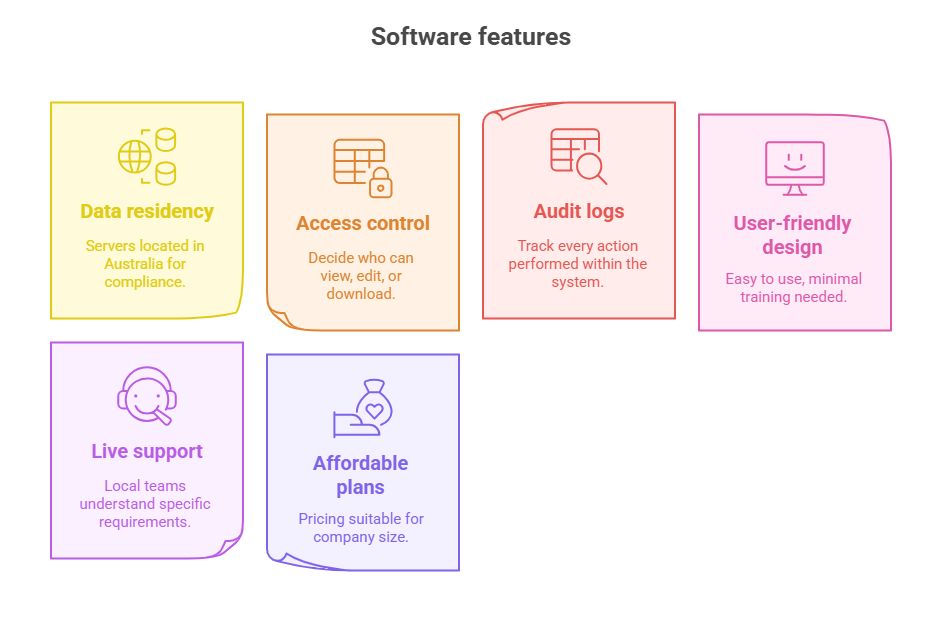Why Australian Businesses Choose Virtual Data Rooms for Secure Transactions
More and more companies in Australia are turning to secure platforms like virtual data rooms, and it’s easy to see why. The VDR market in Australia is experiencing significant expansion. In 2024, it achieved revenue of $77.1 million, and it is expected to rise to $209.5 million by 2030, with a growth rate of 19% between 2025 and 2030. People are investing in document management since financial, healthcare, and government companies rely on safe and simple document processing.
It’s no longer just about storing files. For Australian businesses, it’s about keeping sensitive data protected — without slowing down work or opening the door to unnecessary risks.
Why Local Providers Make a Big Difference
It is very important to use the right virtual data room for working with sensitive information. Many companies are choosing Australian virtual data room providers since these companies know how local laws, privacy, and particular business sectors operate.
Here’s what sets them apart:
- Servers based in Australia to meet local data residency laws
- Built-in compliance with the Australian Privacy Act
- Support teams in your time zone, familiar with local business culture
- Structuring that conforms to regulations and how the site operates
When you’re part of legal services, healthcare, property, or finance, these differences are needed more than they are in most other fields.
The Importance of a Secure Data Room Australia Businesses Can Trust
Think about the kinds of documents your team handles — contracts, financials, client information, and intellectual property. Sending that via email or storing it on generic cloud platforms just doesn’t cut it anymore. A secure data room Australian businesses can rely on means:
- Encrypted document storage and transfers
- Role-based access with detailed permission settings
- Activity tracking so you know who viewed what and when
- Watermarking and expiry options for sensitive files
Imagine a Sydney-based startup preparing for a funding round uses a VDR to share pitch decks and financial statements with potential investors. This helps them to track who accessed the materials, revoke access instantly, and protect their competitive information — all while presenting themselves as a polished, professional team.
How VDRs Support M&A and Due Diligence
Using a data room for M&A in Australia has quickly become standard practice. In mergers, acquisitions, or joint ventures, large amounts of confidential data need to be exchanged between multiple parties under tight deadlines.
A good virtual data room simplifies the process by offering:
- Organized folder structures for fast navigation
- Custom access levels for legal teams, buyers, and advisors
- Real-time notifications when documents are viewed
- Full audit trails for transparency and accountability
The purpose of using a VDR for due diligence is to continue the process smoothly, maintaining good security. As a seller or a buyer, you must be sure that only certain details are accessible to anyone at any time.
For instance, a law firm in Melbourne could organize a three-way merger by using a VDR, as it would benefit dozens of stakeholders. Instead of juggling emails and insecure links, everything can be centralized. The platform can help avoid miscommunication, ensure every document is accounted for, and ultimately speed up the deal timeline.
Online Data Room Australia Platforms Go Beyond Finance
Today, an online data room Australia companies can use isn’t just for mergers or legal reviews. VDRs are proving useful across a wide range of industries:
- Real estate teams use them to share zoning paperwork, contracts, and development blueprints.
- Tech startups rely on them to store intellectual property, code documentation, and business plans.
- Nonprofits use VDRs to manage grant proposals, board materials, and donor records.
Remote work has only made these tools more relevant. When documents need to be secure, accessible, and organized in one place, a VDR checks every box.
What to Look for in a VDR Provider
Before you commit to a provider, here are some features worth prioritizing:
- Australian-based servers to meet data residency regulations
- Granular access control to decide who can view, edit, or download documents
- Audit logs so you can track every action
- User-friendly design so teams don’t need hours of training
- Live support, preferably from local teams that understand your needs
- Affordable plans that fit your company’s size and project scope
Leading Australian virtual data room providers also offer flexible pricing models, whether you’re running a small investment round or managing a multi-party real estate deal.

How Australian businesses use VDRs in everyday workflows
Across industries, Australian companies are finding new ways to integrate virtual data rooms into their daily operations. What once was seen as a tool reserved for major transactions is now supporting a wide range of business processes.
Legal teams use VDRs to manage case files and client documents securely. Financial firms rely on them to share reports with investors and regulators. Even HR departments are turning to VDRs to store employment contracts and sensitive personnel records.
The ability to control access, maintain audit trails, and protect information at every stage of the document lifecycle is driving this broader adoption. For any industry where privacy and following regulations are key, a VDR proves very useful.
Conclusion
If you are in tech, finance, law, or real estate, your job will probably involve documents that need to stay secure and should not be seen by the wrong individuals. The transaction becomes organized and hassle-free thanks to the use of a stable, secure data room in Australia.
Local providers offer tailored solutions that align with Australian regulations and expectations. And with the growth of remote work and global collaboration, these platforms are becoming essential, not optional.
A strong virtual data room Australia solution helps your business stay focused, protected, and ready for the next big opportunity.
***************
PRN










